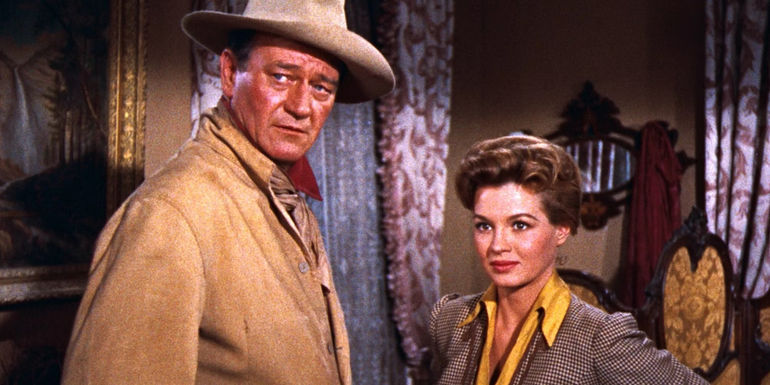
The Impact of John Wayne's Ideologies on Western Film Roles

Exploring the influence of John Wayne's conservative ideals on his involvement in Western films, particularly his rejection of the revolutionary classic, High Noon.
John Wayne's Rejection of High Noon
One John Wayne quote captures his sentiments toward one of the most revolutionary Western movies ever made. Wayne is one of the most famous Western stars of the 20th century and is largely responsible for shaping the genre in the American film industry and beyond. Wayne starred in several groundbreaking Western movies himself including John Ford's breakthrough hits Stagecoach (1939) and The Searchers (1956). Wayne could have starred in any Western movie he wanted to but famously passed on Fred Zinneman's High Noon, harshly calling it 'the most un-American thing I've ever seen.'
High Noon
Released in 1952, High Noon was a new type of Western film that played out more like a tightly-knit thriller. Starring Gary Cooper and Grace Kelly, High Noon was unafraid to challenge the traditional tropes of the American Western which Wayne had become the prized symbol of. Cooper plays Marshal Will Kane, the emblem of protection in a small town who has just gotten married and is set to step down and retire from his role. That is until he gets word that a notorious outlaw named Frank Miller is on a train heading to his town at high noon, forcing Kane back into his position as Marshal for one last showdown.
Gary Cooper dressed as a cowboy in High Noon
John Wayne believed that High Noon was 'un-American' because the protagonist showed signs of disrespect towards his profession as a United States Marshal and American law enforcement altogether. At the end of the film, Cooper's Kane takes his badge off of his chest, throws it on the ground, steps on it, and walks away, which was the final straw for the highly conservative John Wayne. Wayne acted as the President of the Motion Picture Alliance for the Preservation of American Ideals, which was known to be strictly adverse to communism during a time when McCarthyism was at its peak.
The screenplay for High Noon was written by Carl Foreman, who was later blacklisted in Hollywood after being tried by the House Un-American Activities Committee for being a suspected communist and promoting communistic ideals in High Noon. Wayne recognized some of the so-called 'un-American' behaviors of Cooper's protagonist and lost interest. He also found the story to be unrealistic, explaining to Roger Ebert that 'If I'd been the marshal, I would have been so goddamned disgusted with those [expletive] that I would have just taken my wife and saddled up and rode out of there.'
Controversy and Criticism
Both Wayne and celebrated Western director Howard Hawks took issue with High Noon, which ended up winning four Academy Awards and seven total nominations. Hawks also took issue with the character of Kane and the premise of the film altogether, finding him to be a weak protagonist compared to the typical rugged cowboy archetype that Wayne so effortlessly professed. Despite these criticisms, Gary Cooper would win Best Actor for his portrayal of Kane and the film would also win Best Editing at the 1953 Academy Awards.
Ironically, many fans and critics alike would disagree with Wayne's criticisms that Cooper's Kane did not represent a true American hero. Kane does not back down and selfishly ride off into a peaceful life with his newlywed, leaving his township in duress, which embodies Kane's ability to stand up for what's right. Many modern protagonists are sculpted with this type of courage and sympathy in mind, noting the impact of High Noon to this day. Further, the fact that the film wasn't the standard run-of-the-mill Western of the time with shootouts, chase scenes, and landscapes of the American West, excited audiences and challenged Wayne's notion of the traditional Western genre.
Response with Rio Bravo
Wayne and Hawks stuck back with Rio Bravo in 1959, determined to tarnish the legacy of High Noon which was suspected by some of being an allegory of the Red Scare, McCarthyism, and the Hollywood Blacklisting. Rio Bravo tells a similar story to High Noon, although it takes every chance it gets to undermine any hint of communistic ideals, leaving the strategy and the violence to John Wayne's Sheriff John T. Chance and those he sees fit to defend the law.
John Wayne and Angie Dickinson looking off-screen in Rio Bravo
The main difference between Chance and Kane is that the former constantly refuted help from others, promoting the idea of the American individual, while the latter relied on the help of the community, resulting in Wayne's 'Un-American' criticisms of the celebrated and revolutionary classic. While Rio Bravo is considered one of Wayne's best films in his longstanding career, his critiques of High Noon and screenwriter Carl Foreman, who he had a hand in getting deported from the U.S., seem aggressive in retrospect.
















